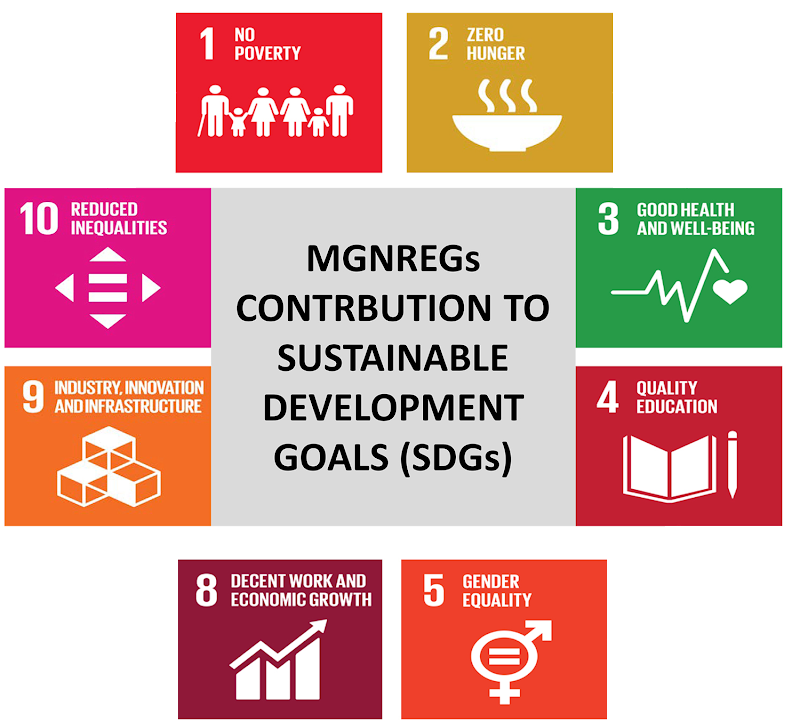By Dr. Gyan Pathak
A frightening reality of MGNREGA Scheme has come to the fore. Wages given under the scheme are inadequate for survival. Payments are delayed. Denial of work is frequent. Funds are scarce. Rural workers’ miseries are multifold, though MGNREGA provides a legal right to work for the most economically disadvantaged sections of the rural population who are willing to work, as a last resort, when they have no other means of livelihood to feed their family members.
This picture emerges from the eighth report of the Parliamentary Standing Committee on Rural Development and Panchayati Raj submitted in the Lok Sabha recently.
The Budget Estimates under MGNREGA for the Financial Year 2025-26 is static at Rs 86,000 crore since the Revised Estimates for 2023-24.Committee failed to find the rationale for not increasing the budgetary allocation, at a time when there is still high demand for work under MGNREGA, and recommended that the Department of Rural Development apprise themselves of the ground level situation more realistically, and press upon the Ministry of Finance for increased allocation.
Additionally, of the Rs 86,000 crore allocation for the current financial year, Rs 23,446.27 crore will be spent to clear pending liabilities, which accounts for 27.26 per cent. Consequently, the actual working budget for the current financial year is reduced to Rs 62.553.73 crore, significantly limiting the scheme’s capacity to function effectively and meet its primary objective of preventing rural distress and ensuring livelihood security.
The liability has been created due to non-payment both as wages and material. As of February 2, 2025, the pending liabilities stand at Rs 12,219.18 crore in wages, Rs 11,227.09 crore in material components. Delay in payment of wages to MGNREGA workers multiplies their miseries since they have no other means of survival.
The Committee are concerned about the chronic delays in wage payments which continue to plague the MGNREGA Scheme, creating uncertainty for workers who cannot afford to wait for their earnings. There is a provision for compensation for delayed payment, but that is paltry at 0.05 per cent. The Committee is of the view that it should be increased, and delayed payment issue be resolved with greater accountability.
There is a failure of wages to keep up with inflation. MGNREGS wages remain below subsistence levels, making it difficult for workers to sustain themselves, observed the parliamentary panel. It was of the opinion that the base wage rates under the MGNREGS should be revised to ensure they align with current economic realities and provide respectful wages to rural workers. At least Rs 400 per day should be provided as wages, as the current rates are inadequate to meet even basic daily expenses. Without a fair wage, the scheme fails in its objective of providing economic security to rural workers.
Ensuring fair and gainful employment opportunities for SC/ST and women workers is crucial for the success of MGNREGS. Despite its objective to uplift marginalized communities, participation of SC/ST and women workers remains inconsistent across districts. The Committee, therefore, had to recommend that there should be a level playing field in terms of providing equal work opportunities to ensure gainful employment for most marginalized and vulnerable sections of the society for their overall holistic development.
Skill development under Project “UNNATI” was launched in 2019-20 with an aim to enhance the skill base of 2 lakh MGNREGA beneficiaries in five years i.e., upto March,2025. However, only 79,643 candidates have been trained so far. The project has clearly suffered from poor outreach and ineffective implementation at ground level.
There is still a key issue within MGNREGS of non-payment of unemployment allowances to workers who are not provided with work within 15 days of asking for it. Despite being a mandated provision, most states fail to implement it effectively, leaving workers without any financial relief.
Social audit of the scheme has been poor. MGNREGA is being implemented in 740 districts of the country, but only in 585 ombudsmen are in place. During the year 2024-25, only 1.79 lakh gram panchayats were undergone social audit at least once, which is only 67 per cent.
No attendance, no work, no wage has plagued the scheme, and one of the reasons of this is technical. Apart from denial of work and payments of wages were also delayed under this scheme due to technical glitches. The committee have noted with concern that the National Mobile Monitoring System (NMMS), introduced on May 21, 2021, to track attendance, has faced significant failures, particularly in offline mode, because of poor network connectivity. The committee was of the view that workers should not be penalized due to system malfunctions. It strongly recommended that capturing attendance on NMMS should be put on hold till the technical glitches occurred in the system is not rectified completely.
Job card deletion has also emerged as serious problem. The parliamentary panel has noted it with concern and said it a persistent challenge in the implementation of the scheme. According to the Data furnished by the Department of Rural Development that in year 2021-22 approximately 50.31 lakh job cards were deleted due to minor spelling errors or mismatches in Aadhaar details from thereon the figures have not come down significantly and thousands of eligible workers are regularly being denied work under MGNREGS. It should be noted that there is no provision of allowing manual verification, which the Committee wanted to be introduced. Guidelines for deletion and restoration of job cards have been issued but the measures are not followed in the right earnest.
Currently, there are guaranteed work limits of 100 days for workers in general but 150 days under Drought Relief Provision and ST households. The committee was of the view that the number of guaranteed work days need to be increased by at least 150 days and 200 days for respective categories. However, it should be noted that average days of employment actually provided per household in 2024-25 was only 50.24 days. (IPA Service)




 Trump’s 90 Day Pause May Lead To Some Recalibration Of Tariff Rates
Trump’s 90 Day Pause May Lead To Some Recalibration Of Tariff Rates 